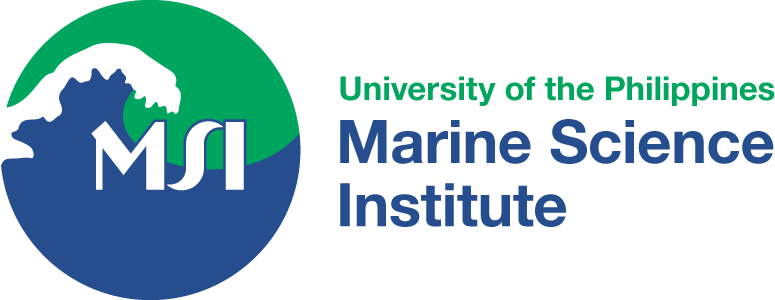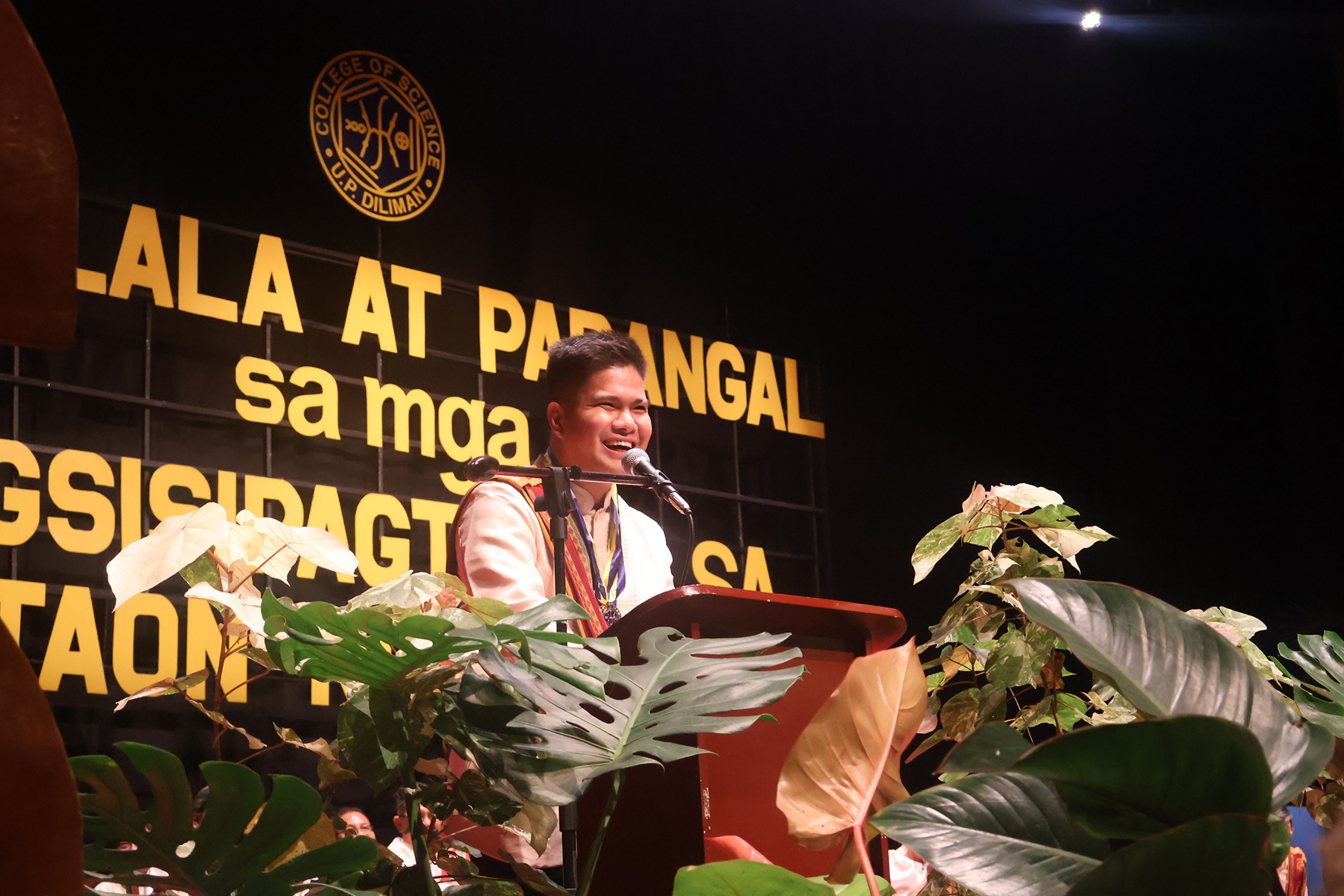Bienson Ceasar De Vera Narvarte, PhD, Named Most Outstanding PhD Graduate and Dr. Edgardo D. Gomez Awardee
Featured photo: Ben on the Rise. Bienson Ceasar De Vera Narvarte addressing his fellow graduates in his speech at the College of Science Recognition Rites.
Bienson Ceasar De Vera Narvarte, PhD, received the Most Outstanding PhD Graduate distinction and the Dr. Edgardo D. Gomez Award during the College of Science Recognition Rites held on July 5, 2025, at the University Theater of UP Diliman. The Most Outstanding PhD Graduate award is given to the PhD graduate who has demonstrated academic excellence and has publications in a peer-reviewed journal. Meanwhile, the Dr. Edgardo D. Gomez Award recognizes the PhD graduate with an exceptional academic record and the most published or accepted papers, in tribute to Dr. Edgardo D. Gomez of the UP Marine Science Institute, who dedicated his life to scientific research.
Below is the full transcript of Dr. Narvarte’s speech.
Magandang hapon po sa ating lahat.
To the dean, faculty, our guest speaker, my fellow graduates, friends, and family- thank you for sharing this special afternoon with us.
To be named the Most Outstanding PhD Graduate of the UP College of Science is incredibly humbling, and honestly, quite unexpected. Because if you told me years ago that I’d become a seaweed scientist… malamang, tinawanan lang kita.
But before anything else, congratulations to all my fellow graduates. Alam kong ang bawat isa sa atin ay may kani-kaniyang laban, kwento, at sakripisyo. Some of us battled deadlines, others battled doubt. Many battled both. So wherever you came from, whatever you carried, saludo ako sa inyong lahat.
Let me take you back- not to a laboratory or a lecture hall- but to a beach.
It all started with something simple. “Tara, beach tayo.” A friend invited me right when work was getting crazy. Just a quick weekend escape to Puerto Galera. I packed light. Just sunshine, some chips, and an ice-cold beer in mind. Marine life was definitely not part of the plan.
Then I put on a snorkel, dipped my head underwater, and- boom- something shifted.
Beneath the waves was a quiet world, pulsing with life- sea grasses swaying like dancers, corals like cathedrals, and yes, seaweeds- those pesky, slimy things that stuck to your feet- suddenly glowing like emerald tapestries. The ocean whispered something ancient, and though I didn’t speak its language, somehow… I understood.
That’s how it began. No thunderclap. No grand epiphany. Just a soft click in the heart. A quiet kind of wonder. Next thing I knew, I was at the Marine Science Institute. Confused, curious, completely out of place- and yet, oddly at home. I didn’t know the jargon. I didn’t know anything about seaweeds. Zero. Not even how to pronounce their scientific names.
But here’s the first lesson I want to share: Everything can be learned. You don’t need to know everything to begin. You just need to begin.
I said “yes” to a project with a new professor. I had no idea what I was signing up for. It wasn’t a loud or confident yes- just a small, uncertain one. But that quiet yes opened a door I didn’t even know existed. And through that door, I found seaweeds. Or maybe, they found me.
Fast forward, and here I am, wading through seaweed farms, listening to fisherfolks who may not have PhDs, but understand the ocean in ways science still can’t fully explain. I share what I’ve learned, get sunburnt in places I didn’t know could burn, and hold on tight to my life vest, because yes, until now, I still don’t know how to swim.
But maybe that’s the second lesson: You don’t need to be ready. You just need to be willing. Readiness is a myth. No one ever feels truly ready. But willingness- that quiet, stubborn kind of courage- that alone has the power to move mountains and navigate the deepest seas.
My PhD journey was not a straight path. It twisted and turned, got stuck in the mud, drifted without direction, got rescued by good friends, and yes, there were moments it completely capsized. Experiments failed. Hypotheses fell apart. Manuscripts were returned bleeding with red ink. Deadlines came and went. Confidence cracked…..But progress isn’t linear. Research isn’t a highway. It’s a meandering path full of thorns, dead ends, and moments you feel completely lost. But if you don’t give up, you will find patches of light- quiet and beautiful moments that remind you it’s all worth it.
And then there’s feedback. “Revise and resubmit.” “Major revisions.” “We regret to inform you… blah blah blah.” — messages that felt like heartbreak letters. Sometimes, they came after months of waiting, only to be told your work wasn’t “novel enough,” your data was “inconclusive,” or your writing was “unclear.” One reviewer even said, “This study has limited value.” Another simply wrote, “Not suitable for publication.” And in those moments, I’d sit there—staring at my screen—wondering if all the efforts, the sleepless nights, the caffeine-fueled coding marathons, were all for nothing. But eventually, I realized: Feedback is not failure. It is the fire that tempers, the tide that reshapes the shore, and the current that teaches you how to swim. Feedback is a gift—sometimes wrapped in sandpaper, but always a gift. I learned to listen. To process. To improve.
But none of this- I repeat, none of this- would have been possible without my mentor, Dr. Michael Y. Roleda. Not just a brilliant scientist, but a quiet lighthouse in my storm. He let me stumble, let me question, let me grow. He never made me feel small for not knowing. Instead, he reminded me that curiosity is more powerful than certainty.
That’s something no one tells you about a PhD: A good mentor can change your life.
In my darkest moments- when imposter syndrome whispered, “You don’t belong here,” and exhaustion said, “Just Give up,”– he never pressured. He simply believed. And sometimes, belief is the greatest gift anyone can give.
And maybe that’s the most magical part of science: It’s not just about discovery.
It’s about people. Labmates who offer you coffee and comfort. Friends who say “Kaya pa ba?” and show up anyway. Family who prays for you even if they don’t fully understand what PCR means.
And finally, the lesson that ties everything together: Science must serve. We don’t chase knowledge just to publish it. We chase it to uplift. We do it for the people- for farmers who wake up before sunrise to plant lines in the sea, for communities who depend on the ocean, for children who deserve a planet that’s still full of coral gardens and clear waters. Science must not stay in the lab or the journal. It must wade into the sea. It must listen. It must help.
So to anyone still wondering if they belong in science- this is for you. You, who feel behind. You, who ask questions quietly. You, who doubt. You are not alone.
We come from all corners of curiosity: The chemists who talk to beakers, The biologists who name every plant on a hike, The physicists who argue with gravity, The mathematicians who find beauty in chaos, The marine scientists who smell like seawater half the time, The geologists who collect more rocks than hobbies, The environmental scientists who remind us the Earth is running out of patience, The molecular biologists who whisper to genes and argue with PCR, And the materials scientists who turn atoms into miracles and broken glass into breakthroughs. We are different in methods, but the same in spirit: We wonder. We ask. We try again. And that is the heartbeat of science.
My fellow graduates, as we push our way into new tides, I offer this: dare to say yes. My own yes was small, uncertain- spoken more by wonder than by confidence. But it cracked open a door, and through it I learned: you don’t need to know everything to begin. You just need to begin. When feedback came like crashing waves, I floundered- but rose. It wasn’t failure. It was the ocean, patient and wild, teaching me how to swim. And in that sea, a mentor stood like a lighthouse- not giving me the map, but letting me chart my own way, with space to ask, to falter, to grow. That faith changed my course. So, as we set sail from this shore, may we keep saying yes- not because we are certain, but because we are curious. Not because the waters are calm, but because the journey matters. Say yes- bravely, humbly, and with purpose.
Before I close, please allow me to express my heartfelt appreciation to the following wonderful people who have played a special part in my research journey.
To Dr. Michael Y. Roleda- thank you for the patience, the wisdom, and for never laughing too hard when I made very obvious mistakes.
To UP Marine Science Institute, and the Bolinao Marine Laboratory- thank you for being my academic home, thank you for the nurturing environment, the inspiration, and the sense of belonging that carried me through the highs and lows of this journey.
To DOST-PCAARRD, for the generous scholarship and support that made this academic pursuit possible.
To my parents- thank you for your endless patience and prayers, for always asking how I am even when you didn’t fully understand what I was doing. Hindi man kayo scientist, pero kayo ang unang nagturo sa akin ng tiyaga, sipag, at paniniwala sa sarili.
To the AlgaE team,for all the laughter, jokes, and academic discussions that brightened my days and made this journey so much more enjoyable.
To my partner, Potchi,- thank you for being my calm in the chaos. For celebrating the wins, no matter how small, and for holding space during the breakdowns. You reminded me to rest, to breathe, and most importantly, to believe that I could do this- even when I forgot.
And above all, to God- thank You for the strength I didn’t know I had, the grace I didn’t think I deserved, and the guidance I didn’t always see but always needed. All glory goes back to You.
Muli, isang taus-pusong pagbati sa lahat ng kapwa ko nagsipagtapos. Sa bawat pagod, puyat, at luha- narito tayo. Ngayong araw, hindi lang natin ipinagdiriwang ang ating mga diploma, kundi pati ang ating tibay, paglago, at pag-asa.
Habang tayo’y nagpapatuloy sa susunod na yugto, nawa’y huwag nating kalimutan kung bakit tayo nagsimula. Let us carry our science beyond the classroom. Let us bring it to the shores, to the fields, to the people who need it most.
Padayon mga iskolar ng bayan!! Para sa karagatan. Para sa kalikasan. Para sa bayan.

